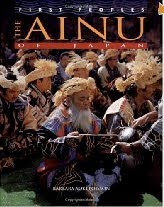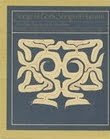
Cooking is one of my many passions, and I have often re-created Ainu meals. This is not hard in Hokkaido, where I have access to the same food sources the Ainu had. In fact, much of their food traditions have been adopted by the Japanese who live in Hokkaido. This is particularly true of salmon, a food source so important to the Ainu that their common word for "food" was the word for salmon. The Ainu Museum in Shiraoi, Hokkaido, has an English section on their website that has some more information about Ainu eating habits.
As I was translating Iyomante~meguru inochi no okurimono (English working title: The Ainu and the Bear~ the gift of the cycle of life), I was struck by how often food is mentioned in the story. At the start of the book, the men of the village return from a hunt laden with bear meat. This is served to everyone in the village in a rich, fatty stew-- a very rare treat for the villagers. The meat that is left over is cut into strips and dried on drying racks above the hearth. When autumn comes, the "trees groan under the weight of acorns and walnuts. The sweet smell of wild grapes and kiwi berries drifts on the air. The river teams with salmon, which cause the river to undulate with silver." The Ainu boy picks the sweetest of the berries and catches the liveliest of the salmon to take back to the bear cub, who has grown big enough to be put in a cage made of logs.
When the date for the "bear-sending" is set, the whole village bustles with the food preparation tasks associated with the ceremony. As they make the millet wine, the women sing the wine-making songs passed down to them from their ancestors, and after a few days "a delicious smell wafts from the wine barrels." After the bear cub is killed, her spirit is invited to a party, a celebration with much eating, drinking, singing, and dancing. Wine is an important gift the bear cub takes back with her to the land of the gods. Later, it is the scarcity of food in the mountains that brings a different bear to the village-- a rogue bear, or "god-gone-bad," from which the Ainu boy, now a man, must protect his people.
In fact, I think it is fair to say that the Iyomante ritual would not exist were it not for the never-ending and pressing need for food, and some sort of assurance that the source of that food will not be cut off. Traditionally, and on a daily basis, the Ainu recognized that their own lives were being sustained by the lives of others. The book closes with these words of the storyteller, "Children... listen carefully to what I have told you and remember it well. Every grain of millet, and every piece of meat and fish, contains the life of another. We feed on the life of others. We are part of a cycle of life. We all partake in the blessing of the cycle of life..."










